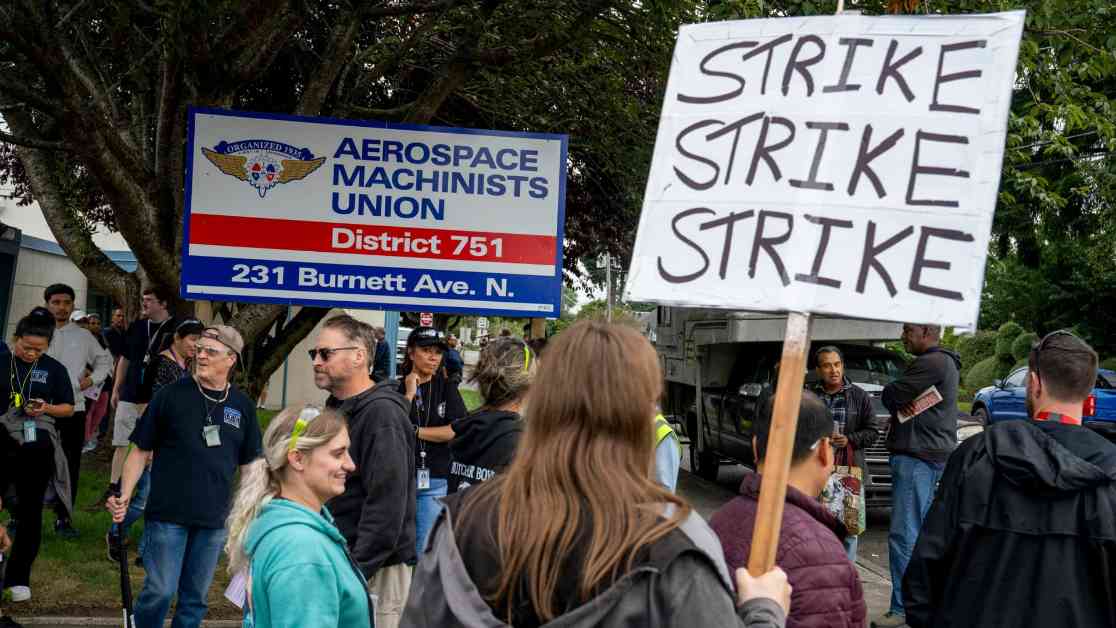Boeing Workers Overwhelmingly Reject Contract, Prepare to Strike
More than 30,000 Boeing workers were set to strike Friday, halting production of most of the company’s aircraft after staff overwhelmingly rejected a new labor contract. This development comes as a blow to the manufacturer, which has been working to ramp up production and restore its reputation following safety crises.
Workers in the Seattle area and in Oregon voted 94.6% against a tentative agreement that Boeing and the International Association of Machinists and Aerospace Workers unveiled Sunday. The workers voted 96% in favor of a strike, far exceeding the two-thirds vote required for a work stoppage.
Strike Looms as Workers Demand Fair Treatment
IAM District 751 President Jon Holden announced the vote’s results at a press conference, stating, “We strike at midnight.” He characterized the strike as an “unfair labor practice strike,” alleging discriminatory conduct, coercive questioning, unlawful surveillance, and promises of benefits that were not fulfilled. Holden emphasized the need for Boeing to bargain in good faith to address the concerns of its workers.
Boeing’s Response and CEO’s Perspective
Boeing did not immediately comment on the rejection of the contract. Prior to the vote, Stephanie Pope, CEO of Boeing’s commercial airplane unit, had expressed optimism about the tentative deal, calling it the “best contract we’ve ever presented.” She acknowledged the challenges of previous negotiations and emphasized the company’s commitment to a new approach in seeking a mutually beneficial agreement.
The tentative proposal included significant wage increases of 25% and improvements to health-care and retirement benefits. However, the union had sought raises of about 40%, citing the increased cost of living as a key concern for workers. The discrepancy between the proposed contract and the workers’ expectations contributed to the overwhelming rejection and decision to strike.
Impact on Boeing’s Recovery Efforts
The rejection of the contract is a setback for CEO Kelly Ortberg, who has been leading the company’s recovery efforts for the past five weeks. Ortberg had urged workers to accept the contract and avoid a strike, warning that it could jeopardize the progress made in restoring Boeing’s reputation and financial stability. The decision to strike reflects the workers’ determination to secure fair treatment and adequate compensation for their contributions to the company.
Boeing’s Commitment to Seattle Area
Under the tentative agreement, Boeing had committed to building its next commercial jet in the Seattle area, a move aimed at winning over workers after the company relocated 787 Dreamliner production to a non-union facility in South Carolina. The promise of continued investment in the Seattle area was a key factor for many workers in considering the proposed contract.
Financial Impact and Industry Outlook
The financial implications of the strike are significant for Boeing, with analysts estimating a potential $1.5 billion cash impact for a 30-day strike. The disruption to production and supply chains could have ripple effects on suppliers and the broader aerospace industry. The tentative agreement, if approved, would have had an annual impact of $900 million, underscoring the importance of reaching a resolution to minimize financial losses.
Challenges in Production and Regulatory Scrutiny
Boeing has faced challenges in production as it works to address manufacturing flaws and industry-wide issues such as supply chain disruptions and labor shortages. The company’s financial struggles have been exacerbated by mounting debt and the fallout from safety incidents, including the grounding of the 737 Max 9 earlier in the year. The need to address these issues while navigating the impact of the strike poses a complex challenge for Boeing’s leadership.
Looking Ahead: Resolving the Conflict and Restoring Trust
As Boeing workers prepare to strike, the focus shifts to negotiations between the company and the union to reach a resolution that addresses the concerns of employees while ensuring the company’s sustainability and competitiveness. The outcome of these discussions will have far-reaching implications for Boeing’s future trajectory and its relationship with its workforce.
In Conclusion
The rejection of the contract by Boeing workers and the decision to strike highlight the deep-seated concerns and frustrations within the company’s workforce. As Boeing grapples with financial challenges and regulatory scrutiny, the need for a fair and equitable resolution to the labor dispute becomes increasingly urgent. The coming days will be critical in determining the path forward for Boeing and its employees as they seek to rebuild trust and collaboration in the wake of this significant development.






















